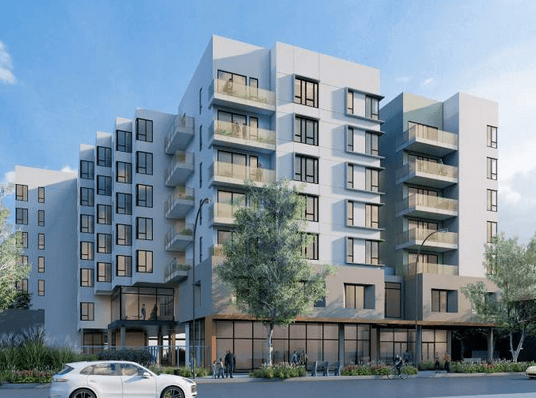At the end of January, the Strategic Growth Council awarded 37 projects a total of $808 million under the Affordable Housing and Sustainable Communities program. The AHSC is funded by California's cap-and-trade program, and its multifaceted aims including reducing greenhouse gas emissions by putting housing near transit, and increasing opportunities for people to safely and comfortably rely on active transportation and transit for their travel needs.
These grants, the sixth round since the AHSC was established, will support the development of 4,463 housing units near transit, over ninety percent of which will be rented at "deeply affordable" rates. Over its existence, the program has invested more than $2.4 billion in 164 sustainable projects, created over 15,000 affordable units, and reduced an estimated 4.4 million tons of emissions.
AHSC projects support housing, and they also include some element that supports sustainable transportation, which could be anything from adding bike lanes and pedestrian facilities to buying electric buses and supporting service expansion at local transit agencies. Many also include urban greening or landscaping. The program emphasizes collaboration among private nonprofit and for-profit developers and local government agencies that usually work in vastly different realms such as transit or housing. In addition, it awards points for anti-displacement strategies and strong community buy-in.
Last fall Governor Newsom doubled the amount of money available for the AHSC, making it possible to support more projects in this sixth round of funding.
A sample project was highlighted by the Antelope Valley Times: the city of Lancaster received its first AHSC grant for $24.6 million. The grant will support the Metrolink Lancaster Terminal Building Project, with 114 units of housing close to Lancaster's downtown and its Metrolink station. It will also include bike and pedestrian connections to the existing bike network, commuter rail upgrades, and the development of an independent energy microgrid that uses solar panels and provides job training in solar installation.
Another successful grant applicant is Umeya Apartments in downtown L.A.'s Little Tokyo neighborhood. This will build 175 units of transit-oriented, affordable housing "that preserves the inclusive legacy of Umeya Rice Cake factory, a bedrock institution for almost 100 years." Additional aspects of this project, which was awarded $30 million, is programming for supportive housing services and job training. It will also build bicycle and pedestrian connections to the nearby light rail station, extending an existing bikeway network, and procure two battery electric commuter express buses to be used by local transit routes.
Locke Lofts, near Beverly/Vermont B Line subway station in L.A.'s Koreatown, will use a $30 million grant to build 150 units of "service-enhanced" housing as part of Enlightenment Plaza, "a nationwide model for addressing the needs of the unhoused with permanent supportive housing with wraparound services." It will also pay for two electric commuter express buses, and create several alternative bicycle and pedestrian routes so people can avoid some of the area's busy corridors.
In Yuba City in Northern California, Richland Village, also awarded $30 million, will build 176 units in a net-zero-energy project that includes electric vehicle charging, as well as a transit center hub nearby with an electric bus charging system. It will also add sidewalks, bike lanes, new crosswalks, traffic calming measures, and pedestrian-level lighting. The award will also help fund workforce development programs, multi-lingual legal counseling services, and transit passes for residents.
The projects listed above are a representative sample of the range of projects that received state funding in this Round 6 of the AHSC, which categorizes projects into transit-oriented development, integrated connectivity, and rural innovation projects. The full list of awards can be found on this PDF from the Strategic Growth Council.
In the coming months, the Strategic Growth Council will conduct a year-long process to update guidelines for the AHSC (see schedule here for workshops and feedback opportunities). Round 7 applications will be due next February. The amount of funding available next year will depend on proceeds from quarterly cap-and-trade auctions as well as budget negotiations between the governor and the legislature.






